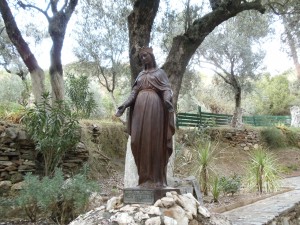
Last December, during our trip to Turkey, one of the sites we saw was the House of the Virgin Mary. I’m not a Christian. Partly because I have a hard time believing in the Immaculate Conception. I was pretty ambivalent about whether we saw the Virgin Mary’s house or not.
However, it was part of our Ephesus tour package. Also, it was a chance to see more of a different region of Turkey than just Istanbul.
The House of the Virgin Mary ended up being like my trip to Salt Lake City and the experience I had while visiting the Mormon Temple: profound.
Our tour bus wound up a rocky hillside to the top of Mt. Koressos. It was a chilly and damp December afternoon. Our guide explained that a German woman who’d had an accident started having visions. Among them were the last days of Jesus’s life and a vision of where his mom, a.k.a. the Virgin Mary, had spent the last years of her life.
The German woman was Anne Catherine Emmerich. She lived from 1774 to 1824. She was able to provide details about the house that Apostle John had built for Mary. Wikipedia had a clip of that from the book that published her visions after her death.
Mary did not live in Ephesus itself, but in the country near it. … Mary’s dwelling was on a hill to the left of the road from Jerusalem, some three and half hours from Ephesus. This hill slopes steeply towards Ephesus; the city, as one approaches it from the south east seems to lie on rising ground…. Narrow paths lead southwards to a hill near the top of which is an uneven plateau, some half hour’s journey.
In 1881 a French priest decided to try and find the location as Emmerich had described it. He found the remains of a stone building atop a mountain that fit the description. He felt it was Mary’s house. No one believed him until about 10 years later when two missionaries also followed the Emmerich’s description and found the same spot.
In 1951 the house was rebuilt. These days it’s both a Catholic and Muslim shrine. Even though the Catholic Church has never officially recognized the house as the Virgin Mary’s (due to lack of “scientifically acceptable evidence”), thousands of people make a pilgrimage there each year.
I was intrigued by the German woman having visions that were written down and that later people followed to find the house. Locals called the house Panaya Kapulu (“Doorway to the Virgin”) even before Emmerich’s visions. It’s believed she lived there about eight years. Her grave was not on the site. It’s believed she was buried elsewhere, someplace in secret.
In both life and death her identity needed to remain protected. If Mary had lived in this location, it would’ve been very dangerous for her as a Christian. At that time people worshiped the king of Ephesus. So I guess she was perhaps one of the first people to be placed in a witness protection program. (Our guide insinuated regardless of their religious belief, the locals had the utmost respect for Mary and went out of their way to ensure her safety.)
The other thing that intrigued me was the Wishing Wall. As we pulled into the parking lot, our guide said, “If you don’t have paper to write on, we can find you some. Many people even use toilet paper from the bathroom.”
The trouble was, I had been fiddling with my camera or something and hadn’t been paying attention to what had been said before that. All I heard was writing on toilet paper and I asked my husband, “Why are we writing on toilet paper?”
He laughed, then explained that people write their wishes down, then tie them to the Wishing Wall because they believe this site is so sacred and the Virgin Mary’s spirit is so strong, it’s a place that has the power to grant miracles and that their prayers will be answered.
Spirit. That word definitely caught my attention. This wasn’t a haunted place in the sense of ghosts I normally jaunt in search of. It was regarded as one with a sacred essence though. And, even though I’m not religious, I am spiritual and I most definitely felt the essence in this very beautiful, serene and peaceful spot.
It left me hoping that if Mary was a real woman, regardless if the Immaculate Conception was true or not, her last days were lived out in harmony.
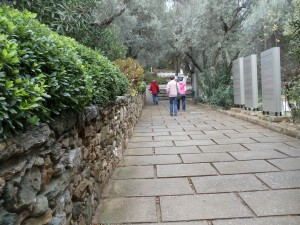
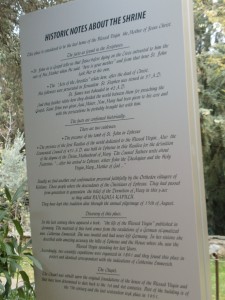
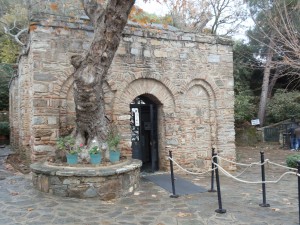
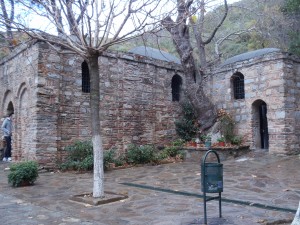
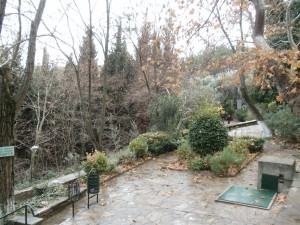
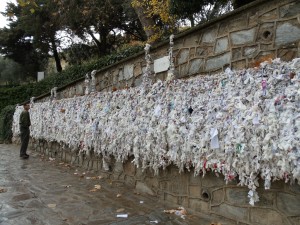


SEE IT FOR YOURSELF
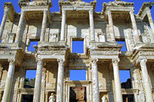
Ephesus and St. Mary’s House Day Trip from Izmir
Courtney Mroch is a globe-trotting restless spirit who’s both possessed by wanderlust and the spirit of adventure, and obsessed with true crime, horror, the paranormal, and weird days. Perhaps it has something to do with her genes? She is related to occult royalty, after all. Marie Laveau, the famous Voodoo practitioner of New Orleans, is one of her ancestors. (Yes, really! As explained here.) That could also explain her infatuation with skeletons.
Speaking of mystical, to learn how Courtney channeled her battle with cancer to conjure up this site, check out HJ’s Origin Story.

We just put money down on a trip to Turkey which includes a stop at the Virgin Mary’s house. Now, I can’t wait!
Oh cool! How long will you be there? What else are you planning on doing? I hope you enjoy it as much as we did. I was absolutely smitten with Turkey. We rarely go back to a place more than once these days it seems, but we both want to return to Turkey. (Heck, we wouldn’t mind looking into living there. We LOVED it that much!)
Would love to see. But as a Catholic, we don’t believe Mary is buried. She died and was taken body & spirit to heaven; incorruptible, as we say. That was her reward for her fiat to God.
I did not know this, Jean. Learned something new thanks to your comment.